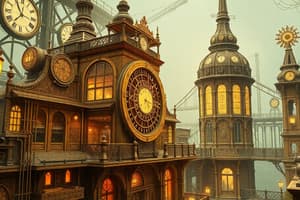Podcast
Questions and Answers
Toyota Motor Corporation的创始人是谁?
Toyota Motor Corporation的创始人是谁?
Sakichi Toyoda
SpaceX的创始人是谁?
SpaceX的创始人是谁?
Elon Musk
Blue Origin旨在通过什么来使太空旅行更加便捷和经济实惠?
Blue Origin旨在通过什么来使太空旅行更加便捷和经济实惠?
开发可重复使用的发射器和创新的推进系统。
谁是一位著名的经济学家和机械工程师,支持可持续能源解决方案?
谁是一位著名的经济学家和机械工程师,支持可持续能源解决方案?
机械工程师在今天推动的全球挑战之一是什么?
机械工程师在今天推动的全球挑战之一是什么?
机械工程师如何利用热力学来设计能效系统?
机械工程师如何利用热力学来设计能效系统?
流体力学如何帮助机械工程师改善机械系统的性能?
流体力学如何帮助机械工程师改善机械系统的性能?
材料科学如何帮助机械工程师提升机械系统的性能和耐久性?
材料科学如何帮助机械工程师提升机械系统的性能和耐久性?
控制系统如何帮助机械工程师设计能够有效控制的系统?
控制系统如何帮助机械工程师设计能够有效控制的系统?
机械工程师如何利用热力学、流体力学和材料科学设计更高效的系统?
机械工程师如何利用热力学、流体力学和材料科学设计更高效的系统?
Flashcards are hidden until you start studying
Study Notes
Mechanical Engineering: A Legacy of Invention and Continued Evolution
Mechanical engineering, a discipline that traces its roots back centuries, has been shaped by the ingenuity and vision of inventors who laid the groundwork for modern technology. As we delve into the world of mechanical engineering, let's explore the legacy of its pioneers and the descendants who continue to innovate and build upon these foundational principles.
Unraveling Mechanical Engineering's Lineage
Origins of mechanical engineering can be traced back to ancient civilizations, where the principles of motion, forces, and energy were first explored and applied. Greek mathematicians such as Archimedes and Hero of Alexandria were among the first to contribute to the field. The Industrial Revolution, however, sparked a rapid expansion of the discipline, as inventors such as James Watt and Thomas Newcomen revolutionized steam engines.
In the 19th century, the likes of James Clerk Maxwell, Sadi Carnot, and Leonhard Euler forged ahead with groundbreaking discoveries in thermodynamics and mechanics, while Nikola Tesla, Thomas Edison, and Alexander Graham Bell made strides in electricity and communication.
The 20th century saw an explosion of innovation, with figures such as Henry Ford and Walter Chrysler transforming the automobile industry, while John Bardeen, William Shockley, and William Brattain invented the transistor, paving the way for computers and electronics.
Envisioning the Future of Mechanical Engineering
Today, the descendants of these pioneers continue to push the limits of mechanical engineering, addressing global challenges and driving technological advancement.
One of the most prominent descendants of the Industrial Revolution is Toyota Motor Corporation, whose founder, Sakichi Toyoda, developed automatic looms that laid the groundwork for the modern automobile industry. Toyota, known for its commitment to innovation, continues to develop cutting-edge technologies such as hydrogen fuel cells, autonomous vehicles, and sustainable manufacturing processes.
In the realm of aerospace engineering, the legacy of NASA's Apollo program is evident in the ongoing efforts of SpaceX, founded by South African-born engineer Elon Musk, to develop reusable rockets and spacecraft. Similarly, Jeff Bezos' Blue Origin aims to make space travel more accessible and affordable through the development of reusable launch vehicles and innovative propulsion systems.
Additionally, many mechanical engineering descendants are at the forefront of environmental initiatives, such as the development of renewable energy technologies and more efficient transportation solutions. For instance, Jeffrey Sachs, a renowned economist and mechanical engineer, has championed the use of sustainable energy solutions, such as wind and solar power, to combat climate change.
Future Challenges and Opportunities
As mechanical engineering continues to evolve, new challenges and opportunities emerge. One of the most pressing challenges is sustainability. Mechanical engineers must develop innovative solutions to reduce waste, lower carbon emissions, and promote energy efficiency.
Another challenge is the integration of multiple disciplines. As technology becomes more complex, mechanical engineers must work closely with experts in fields such as computer science, materials science, and biology to develop advanced and innovative solutions.
Nevertheless, the opportunities for mechanical engineers are vast. As advancements in fields such as robotics, artificial intelligence, and additive manufacturing continue to grow, mechanical engineers will play a pivotal role in shaping these emerging technologies. Moreover, mechanical engineers will have an instrumental role in addressing global challenges such as climate change, resource scarcity, and the growing demand for sustainable and efficient technologies.
Conclusion
Mechanical engineering, with its rich legacy, continues to evolve and inspire innovation. The descendants of its pioneers are driving technological advancement and addressing global challenges, while the discipline itself continues to expand and adapt to new challenges. As we look to the future, mechanical engineers will play a pivotal role in shaping our world, pushing the boundaries of what is possible, and using their knowledge and expertise to create a better tomorrow. "History of Mechanical Engineering." Encyclopedia Britannica, https://www.britannica.com/topic/mechanical-engineering/History "Timeline of Mechanical Engineering." Engineering ToolBox, https://www.engineeringtoolbox.com/timeline-mechanical-engineering-d_1975.html "The History of Mechanical Engineering." Mechanical Engineering, https://mechanicalengineering.asme.org/the-history-of-mechanical-engineering "History of Mechanical Engineering: From Archimedes to the Present." Department of Mechanical Engineering, California State University, Los Angeles, https://www.calstatela.edu/mech/history/ "Toyota's History." Toyota Global, https://global.toyota/en/company/history/ "SpaceX." SpaceX, https://www.spacex.com/ "Blue Origin." Blue Origin, https://blueorigin.com/ "Jeffrey Sachs." Stanford University, https://web.stanford.edu/group/fsi/people/sachsj/ "The Future of Mechanical Engineering." Mechanical Engineering, https://mechanicalengineering.asme.org/the-future-of-mechanical-engineering "Global Challenges: Mechanical Engineers Shaping the World." Mechanical Engineering, https://mechanicalengineering.asme.org/global-challenges-mechanical-engineers-shaping-the-world
Studying That Suits You
Use AI to generate personalized quizzes and flashcards to suit your learning preferences.




